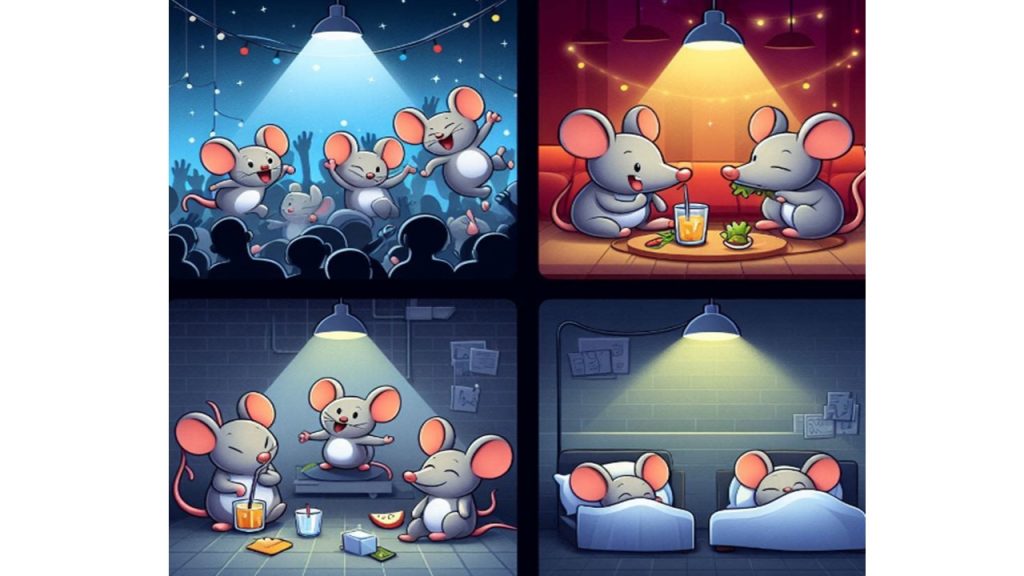For decades our attention has been focused on how learning works. However, at the beginning of 2025 it might be more important to shift our focus of learning research on “not learning”. Recent research on learning includes the study of “social learning” of mice (Winiarski et al. 2025) and the related brain mechanisms that are involved in social learning like the prelimbic cortex.
For our human societies we also rely to a great deal on social learning. In mice, however, the disruption of the prelimbic cortex causes mice to no longer seek “social information related to rewards” from other mice. In Eco-HAB cages these mice follow their scent capabilities to “sort” their information seeking from for example higher “social status animals”. This tested reward seeking behavior allows clues to how learning works. The intervention to disrupt the synaptic plasticity in a later phase of the experiment reveals less social learning from the network social information and fewer contributions to the social network.
Only intact neural plasticity in the prelimbic cortex ensures the maintaining of the social structure. Of course it is highly questionable, whether these results based on animal experiments tell us anything about social structure and social learning in other mammals, but there might be reasons to search for explanations of “no social learning” in humans as well. 
Animal Longevity
- From time to time it is interesting to study animals from many species to maybe learn from them about longevity. Roberto Salguero-Gómez (LINK) developed a sociality continuum and compared 152 species across 13 taxonomic classes. The study reiterates and generalizes the many studies of single species and finds that „more social species live longer, have more generation time and longer reproductive windows“. Social structures amongst animals of the same species influence survival and reproduction as basic demographic processes. These processes determine to a large extent the size of animal populations. Sociality appears to be a major contributor to longevity compared across species. These processes determine the survival of rather solitary species like panda bears (running higher risks of extinction) compared to populations of bees with rather hierarchical predefined social structures. The spotted hyenas developed cooperative hunting and communal care which allows for effective survival compared to other species. Sociality is specific to species and therefore largely determined by genetic factors. Nature rather than nurture is at work. However, species where reproduction occurs later allow for learning curves of sociality. In other words even within species there is scope to improve longevity through sociality. Migration patterns or experience with migration might be yet another determinant of survival or longevity as climate change poses new challenges to many species.

Nutrition Policy
The evidence on nutrition policies has accumulated a series of policy recommendations based on the best available evidence. The German Institute of Human Nutrition has presented these results repeatedly not only to the scientific community, but also to the interested public at the Science Week or the Long Night of Science. Their leaflet on the tools to improve our human nutrition in market economies highlights “nutrition competence” as a key component of a broad strategy to improve our food and subsequently health. Nutrition goes beyond the biological ingredients of food to include basic understandings of human metabolism including the times and timing of meals. This competence has to be transmitted to preschoolers, pupils as well as adults to stem the waves of obesity (ARTE Docu). Learning how to manage your own nutrition is a crucial competence to strive and survive. In schools it can have substantial impacts on performance and inequality of opportunities as well.
The science-based policy recommendations propose to alter the structure of costs, for example via tax reductions, in favor of healthy food. Plain water should be substantially cheaper than sweet beverages or alcoholic drinks. Nuts and proteins from vegetables fall in the same category as plain water. It is in the longer term interest of all of us that schools, canteens at work places or homes for the elderly offer also healthy nutrition at least as a daily option. More sustainability in food production is last, but not least part of nutrition policies. A lot to chew on to improve nutrition.

Sleep biology
Biological processes work hard during our sleep. Our immune system in particular benefits a great deal from undisturbed sleep. This is the simplest summary of the study by Kabrita et al. (2024).
We can study the temporal expression pattern of major histocompatibility complex MHC class I for example in mice. 2 groups of sleep-restricted versus normal mice reveal the biological impact of sleep restriction. In comparison to the control group sleep restriction in mice produced a bimodal pattern of Splenocytes with higher protein levels during the resting period. Such an increased protein expression during resting periods indicates a “preparedness for a potential infection”. Sleep recovery, even if short compared to the longer sleep restriction, allows to return to the baseline of protein levels. The good message is that at least mice seem to recover rather quickly from sleep deprivation with their immune response system.
The biology of repeated phases of longer sleep deprivation could inform us on the implications of sleep deprivation on aging processes. The biological responses in single event sleep deprivation seem to show a fast recovery pattern. Probably it is worth studying the same recovery process of groups of young versus aged mice.
Anecdotal evidence from myself indicates that recovery after sleep deprivation in older humans is no longer as fast as at younger ages. Behavioural responses might be less sleep deprivation (less fun) or longer recovery periods (stay in bed longer). The behavioural response of humans appears to be an obvious one. Instead of either or, we tend to go for both at the same time.
(AI Image: BING +Dall-E. one group of mice is partying in a club at night. Another group of mice is sleeping tight in another room. Cartoon-like images. 2024-3-18) 

